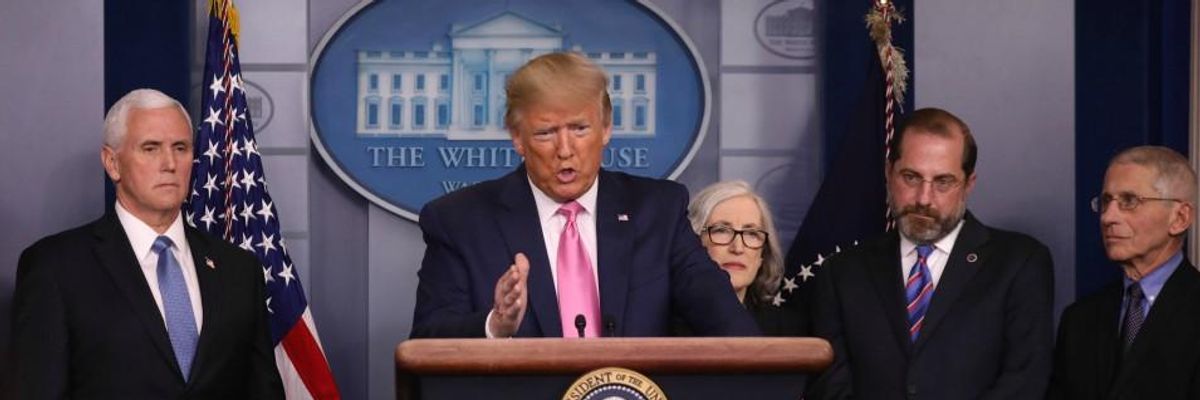A consistent rule of the Trump presidency is that no matter the subject, the retrospective evidence will demonstrate that Donald Trump's actions, and those of his appointees, were more twisted and criminal than the previous speculations of his bitterest critics.
This phenomenon may spring from what former GOP operative (and current penitent) Stuart Stevens calls a failure of the imagination by the political classes: "the inability to imagine Trump." They thought life would pretty much go on as before, regardless of some narcissistic imbecile's Twitter rants.
The broken remains of that mindset can now be swept into the dustbin of history. The Bob Woodward tapes give irrefutable evidence that Trump was not a mere incompetent blunderer. He fully understood the danger of coronavirus from an early date, but willfully and repeatedly played it down and lied about it to the public. This behavior goes well beyond incompetence, and even recklessness, and into the domain of calculated mass killing for political purposes.
The pundits and opposition politicians have already jumped on the political angle, but in their characteristic fashion. They call Trump's conscious deception a sign that all he cared about was reelection, imputing that his stated rationale of "not causing a panic" was intended to shore up the stock market (and thus his reelection). But this again shows a failure of the imagination, even if it's true in a factual sense, because it omits the rest of the story.
"Clear and consistent advice to the public in mid-February as part of a nationally coordinated strategy is unlikely to have caused panic, but rather, encouraged more orderly behavior that would have mitigated the pandemic."
First, the "don't panic the stock market" excuse (which Trump did not say on tape, but which the White House, aping the very media it disdains, has now retroactively employed as an alibi) is not a valid reason by any civilized standard for allowing unnecessary deaths. In any case, clear and consistent advice to the public in mid-February as part of a nationally coordinated strategy is unlikely to have caused panic, but rather, encouraged more orderly behavior that would have mitigated the pandemic.
Instead, the gaping absence of coherent guidance, combined with 50 scattershot, uncoordinated, and ad hoc state plans, did indeed cause panicky behavior in March and April, leading to shortages of masks and hoarding of toilet paper, hand sanitizers, and other items. It turns out that when people's lives are in jeopardy, an N-95 mask is more valuable to them in that moment than 50 shares of Tesla.
Second, it doesn't take Sherlock Holmes to link a chain of behavior from Trump's newly revealed statements of intent to the actions of his son-in-law Jared Kushner, whose coronavirus task force met in March and early April, shortly after Woodward had taped the president's comments. A proposed national testing plan was deep-sixed because the panel perceived that coronavirus was hitting Democratic areas harder, and the political blame could be shifted to Democratic governors.
The Trump administration's subsequent actions followed inexorably: dismissing early intelligence reports, delaying life-saving measures, censoring or suppressing guidance manuals, firing scientists trying to do their job, touting patently phony or dangerous "cures," deriding masks, and doing their worst to foment division and hatred at a time when social trust was most needed. The stupidest leader imaginable randomly might have gotten something right; Trump's one hundred-percent record of failure was carefully calculated to achieve a specific result: mass death and a ready-made scapegoat.
Calling these actions genocide naturally makes the parochial, plain-vanilla American sensibility boggle. That's something that only happens in foreign countries where dictators wear military uniforms. And genocide is imagined as something kinetic: roundups, shootings, gassings. But they can also be performed by withholding provisions necessary to sustain life: food (as in the Ukrainian Famine), shelter, medical supplies. How is seizing shipments of protective masks intended for coronavirus hotspots morally any different from Stalin's goons confiscating grain in Ukraine, or the British shipping food products out of Ireland throughout the period it was being devastated by the Potato Famine?
"The stupidest leader imaginable randomly might have gotten something right; Trump's one hundred-percent record of failure was carefully calculated to achieve a specific result: mass death and a ready-made scapegoat."
No: Trump, Kushner, and the rest of them did not throw the switch of a gas chamber or shoot anyone in the back of the neck. But neither did Hitler or Himmler; they simply gave verbal orders, never written down, in oblique, euphemistic terms that were perfectly understandable to subordinates who knew what would please the boss, and who didn't need a diagram drawn for them.
Perhaps the most distasteful thing Americans must face is not Trump and the relatively small number of conspirators in his administration who carried out his action. It is the millions of citizens who think it's all just marvelous, even something that reinforces their faith in Donald Trump. It got surprisingly little attention, but an August poll found that a solid majority of Republicans found the number of COVID-19 deaths "acceptable." That was when the toll stood at 170,000. It's now closing in on 200,000. What would be unacceptable? A million? Ten million?
In the wake of Trump's electoral college selection in 2016, a lot of liberal publications wheeled out high-minded pieces with titles like "How to talk to a Trump supporter." So, perhaps we should talk to them "with loving empathy" or maybe bake them some cookies? Maybe my empathy gene is weakening, but these supporters seem a whole lot more like what historian Daniel Goldhagen called "ordinary Germans." They cheered on the spectacle, labeled every act of aggression "self-defense," and stayed fervently loyal until it all came crashing down. Then they retreated into feigned ignorance and innocence.
Behind all their saccharine homilies about being hard-workin' just-plain folks, they know perfectly well why they fervently support their current messiah.

